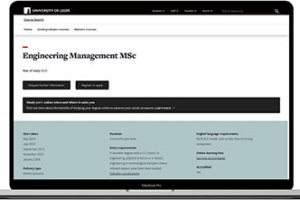MSc vs MBA for Engineering Managers
Becoming an Engineering Manager is the next step in most technical engineers’ careers. Taking the leap to integrate your technical skills with management skills is the perfect way to progress an engineering career.
An MBA is the first option that comes to mind when considering that much-needed career leap. But, is an MBA the best progression route for engineers or would a more specialised course tailored to the needs of the industry be better?
Comparing MSc vs MBA should help you determine your next steps into Engineering Management roles.
General vs Specific

MSc is a specialised course which will bring you up to speed with leadership in the cutting edge of the engineering industry.

MBA is a generalised course in management in a business environment, with little technical focus.
An MBA is a general management Masters course giving you the skills to fast-track into management roles across a range of industries. The general breadth of content taught on an MBA allows the application of skills learned in many roles within many corporations and industries; the flipside is that there is a lack of specificity in an MBA to one industry in particular unless the course incorporates specific industry examples within assignments for example.
That’s where the MSc can spark success. The Engineering Management MSc is unique to the engineering industry, teaching you how to become an inspiring leader in engineering. It focuses on the depth of knowledge, rather than the breadth of content.
Whilst an MBA focuses on the management skills across multiple industries, with the opportunity to specialise for certain modules, the MSc allows you to cultivate two sets of skills simultaneously. This makes you well-equipped to solve complex business issues with the added benefit of having the technical knowledge to drive business decisions in the engineering sector.
Theoretical vs Practical

Case study examples relate to real-world challenges in engineering enterprises such as climate change and disruptive technologies.

Case study examples relate to real-world challenges in a range of sectors including finance and creative industries.
An MBA focuses on the traditional, and sometimes more modern, theories of management in a business setting. Case study examples relate to real-world challenges in a range of sectors including finance and the creative industries for example. This allows individuals from a variety of backgrounds to learn management theory that can be applied to their sectors respectively.
By contrast, the Engineering Management MSc would provide case study examples relating to real-world challenges in engineering enterprises such as climate change and disruptive technologies. This enables you to synchronise work and study, making the course practically applicable in a day-to-day role as an engineer. You can also compare academic theory with practical real-world examples and work practices are hugely valuable in the workplace, particularly in the constantly-evolving engineering sector.
Business vs Technical

Gives you the management techniques to apply to engineering problems as a stand-out leader.

Gives you the broad management theory to apply to any industry as a leader.
Skill-wise, an MBA focuses on business skills and acumen for managers to give you a well-rounded view of skills and behaviours that good managers possess in an organisation. This could be a marketing manager or a financial manager for example, as well as managing in engineering.
On the other hand, the Engineering Management MSc integrates engineering knowledge with management knowledge and skills, to respond effectively to the specific opportunities and challenges facing an engineering leader. Becoming an Engineering Manager adds value to an organisation by bridging the communication gap between these two integral business functions, to stimulate collaborative innovative and efficient working environments.
Adding organisational value is what all leaders should aspire for in their role, which is why weighing up your options is very important when looking to progress into management positions.
Managers vs Engineering Managers

Learn from real-world experts in engineering management.

Learn from real-world experts from a broad range of sectors.
An important factor when deciding which course to pursue can often be around who is delivering that course. On an MBA, you’ll learn from experts in management, but with the MSc, you’ll learn from experts in engineering management.
What does that mean? There has never been a more important time for businesses to have technically competent leaders, and that would put you at the forefront of that change in demand, giving you the desirable skills to engineer your future.
This again gives you another decision point about whether you want to learn from a management expert or an engineering management expert. Obviously, there are benefits to both, but knowing the academic expert teaching you is another step to choosing the right pathway for you.
Business Networking vs Engineering Networking

Network with professionals from the engineering industry.

Network with professionals from a wide range of sectors in the business world.
Summary: MSc vs MBA
Ultimately, the decision for a Masters degree comes down to you, what excites and inspires you, and what career aspirations you have for the future. If your goal is to have a broad knowledge of the general approach to management, an MBA might be better suited to you. However, if you want to gain management skills but want to broaden and deepen your expertise in your field of engineering, choose the Engineering Management MSc.
Networking is more important in modern society now than ever. Making connections with people at work and outside can lead to endless opportunities. Why? Because developing meaningful professional relationships within your industry can expose you to new and improved processes and ways of working, as well as useful contacts for future job opportunities or collaborations.
Business Networking is an essential part of modern business and can take different forms (exchanging a business card or having a conversation). This is a more general networking type which can be formal or informal and with people from a range of industries. This allows you to build a network of professionals across the globe such as senior leaders and managers..
Engineering Networking relates to networking specifically with engineers. As the MSc Engineering Management course is for engineers to progress into management roles, you will have the opportunity to build a specific network of engineers across the globe. This is a fantastic opportunity to build meaningful professional relationships with engineering professionals which could be key contacts now and for the future.

Did you enjoy this blog? Here's some related engineering content that you may be interested in:
Want to learn more about our online Engineering Management course?

Check out the course content and how to apply.

